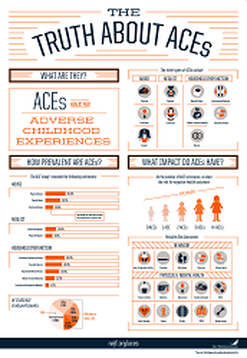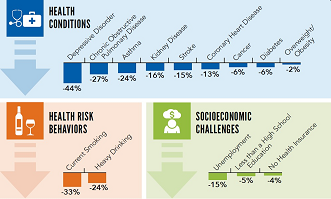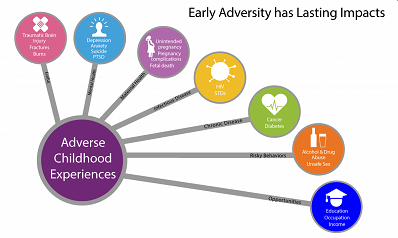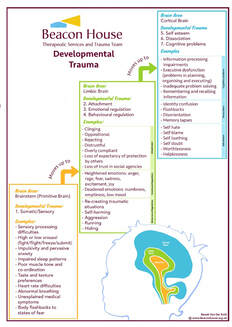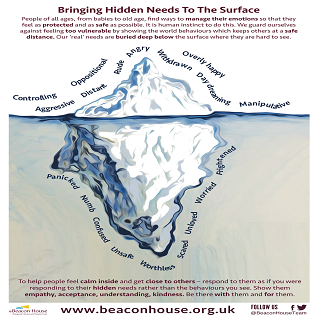What are ACEs?Adverse Childhood Experiences, or ACEs, are potentially traumatic events that occur in childhood (0-17 years) such as experiencing violence, abuse, or neglect; witnessing violence in the home; and having a family member attempt or die by suicide. Also included are aspects of the child’s environment that can undermine their sense of safety, stability, and bonding such as growing up in a household with substance misuse, mental health problems, or instability due to parental separation or incarceration of a parent, sibling or other member of the household.
Traumatic events in childhood can be emotionally painful or distressing and can have effects that persist for years. Factors such as the nature, frequency and seriousness of the traumatic event, prior history of trauma, and available family and community supports can shape a child’s response to trauma. "ACEs" comes from the CDC-Kaiser Adverse Childhood Experiences Study, a groundbreaking public health study that discovered that childhood trauma leads to the adult onset of chronic diseases, depression and other mental illness, violence and being a victim of violence, as well as financial and social problems. The ACE Study has published about 70 research papers since 1998. Hundreds of additional research papers based on the ACE Study have also been published. The ACEs the researchers measured:
Subsequent to the ACE Study, other ACE surveys have expanded the types of ACEs to include racism, gender discrimination, witnessing a sibling being abused, witnessing violence outside the home, witnessing a father being abused by a mother, being bullied by a peer or adult, involvement with the foster care system, living in a war zone, living in an unsafe neighborhood, losing a family member to deportation, etc. |
What is ACEs science?
ACEs science refers to the research on the prevalence and consequences of adverse childhood experiences, and what to do to prevent them. It comprises:
The CDC-Kaiser Permanente ACE Study and subsequent surveys that show that most people in the U.S. have at least one ACE, and that people with four ACEs— including living with an alcoholic parent, racism, bullying, witnessing violence outside the home, physical abuse, and losing a parent to divorce — have a huge risk of adult onset of chronic health problems such as heart disease, cancer, diabetes, suicide, and alcoholism. Brain science (neurobiology of toxic stress) — how toxic stress caused by ACEs damages the function and structure of kids’ developing brains. Health consequences — how toxic stress caused by ACEs affects short- and long-term health, and can impact every part of the body, leading to autoimmune diseases, such as arthritis, as well as heart disease, breast cancer, lung cancer, etc. Historical and generational trauma (epigenetic consequences of toxic stress) — how toxic stress caused by ACEs can alter how our DNA functions, and how that can be passed on from generation to generation. Resilience research and practice — Building on the knowledge that the brain is plastic and the body wants to heal, this part of ACEs science includes evidence-based practice, as well as practice-based evidence by people, organizations and communities that are integrating trauma-informed and resilience-building practices. This ranges from looking at how the brain of a teen with a high ACE score can be healed with cognitive behavior therapy, to how schools can integrate trauma-informed and resilience-building practices that result in an increase in students’ scores, test grades and graduation rates. |
Why are ACEs significant?
|
The ACE Study revealed six main discoveries:
|
LINKS & RESOURCES
- CDC ACE Study site
- Aces Science 101
- The 10 ACE Questions (and 14 resilience survey questions)
- The Pair of ACEs: The Soil in Which We’re Rooted, the Branches on Which We Grow
- ACE Study primer — KPJR Films, which came out with Paper Tigers in 2015 and Resilience in 2016, put together this five-minute overview of the ACE Study.
- ACE Study video — Three-minute trailer for a four-hour CD of interviews with ACEs researchers produced by the Academy on Violence and Abuse.
- How childhood trauma affects health across a lifetime (16-minute TED Talk by Dr. Nadine Burke Harris)
- The Adverse Childhood Experiences Study – the largest public health study you never heard of – started in an obesity clinic
- Preventing Adverse Childhood Experiences (ACEs): Leveraging the Best Available Evidence
|
|
|
|
Beacon House is passionate about developing freely available resources so that knowledge about the repair of trauma and adversity is in the hands of those who need it. Please feel free to use our resources in your home or work setting.
RESOURCES ON: Development Trauma, Neurosequential Model, Occupational Therapy, Trauma and Attachment in the Classroom, Child and Family Mental Health, Animations, Inner World Work |
|
|
SHORT FILM | ReMovedMatanick, N., Matanick, C. 2014. ReMoved is a short film following the emotional journey of a nine-year old girl who is taken from her abusive birth home and placed in the tumultuous foster care system. After winning multiple awards at several film festivals within the United States and internationally, this 13 minute film proceeded to spread virally online. The ReMoved Film was created with the intent to bring light to the often unknown subjects of Foster Care and Child Abuse/Neglect. Two additional ReMoved films were made in the series.
|
